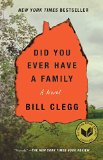Summary | Excerpt | Reading Guide | Reviews | Read-Alikes | Genres & Themes | Author Bio

'At once tragic and madcap, Sharpe's second novel offers an acidly funny portrait of a 'diminished nuclear unit' coping with its patriarch's pharmacologically induced stroke.'
Bernard Schwartz has lost his wife, his career, and finally, thanks to the accidental combination of two classes of antidepressants, his consciousness. He emerges from a coma to find his son Chris, the perpetual smart-ass, and his daughter Cathy, a Jewish teen turned self-martyred Catholic, stumbling headlong toward trauma-induced maturity. The Sleeping Father is about the loss of innocence, the disorienting innocence of second childhood, the biochemical mechanics of sanity and love, the nature of language and meaning, and the spirituality of selfhood. But most of all it is about the Schwartzes, a singular yet typical American family, making their way the best way they know how in a small town called Bellwether, Connecticut.
The Sleeping Father is the talk of the literary world at the moment. It's the breakout book from a respected but little-known writer, published by a respected but small publisher who paid a mere $1,000 advance for it. The buzz started when The Sleeping Father received a full page review in the New York Times Book Review - a very coveted thing indeed and almost unheard of for a paperback original. Then the novelist Susan Isaacs chose it as the February Today show book club pick. At the time of writing it's in its 3rd printing with a total of 40,000 copies in print. Still small fry compared with the Grishams of this world but nonetheless very credible.
Having finished reading it a few days ago this reviewer is still trying to work out what to make of it. It's cleverly written, there are no end of memorable one-liners and the irony never lets up. However, this becomes a little exhausting after a bit and prevented this reviewer from caring sufficiently about the characters to either laugh with them, or at them.
This is the sort of book that readers are likely to love or hate, if you've enjoyed books such as The Corrections by Jonathan Franzen, then you're likely to fall into the former category. Decide for yourself whether it might be for you by reading the first 25 pages exclusively at BookBrowse.

If you liked The Sleeping Father, try these:

by Bill Clegg
Published 2016
The stunning debut novel from bestselling author Bill Clegg is a magnificently powerful story about a circle of people who find solace in the least likely of places as they cope with a horrific tragedy.

by Dara Horn
Published 2006
With astonishing grace and simplicity, Dara Horn interweaves a real art heist, history, biography, theology, and Yiddish literature. Richly satisfying, utterly unique, her novel opens the door to "the world to come"—not life after death, but the world we create through our actions right now.
If you want to build a ship, don't drum up people... but rather teach them to long for the endless immensity of the...
Click Here to find out who said this, as well as discovering other famous literary quotes!